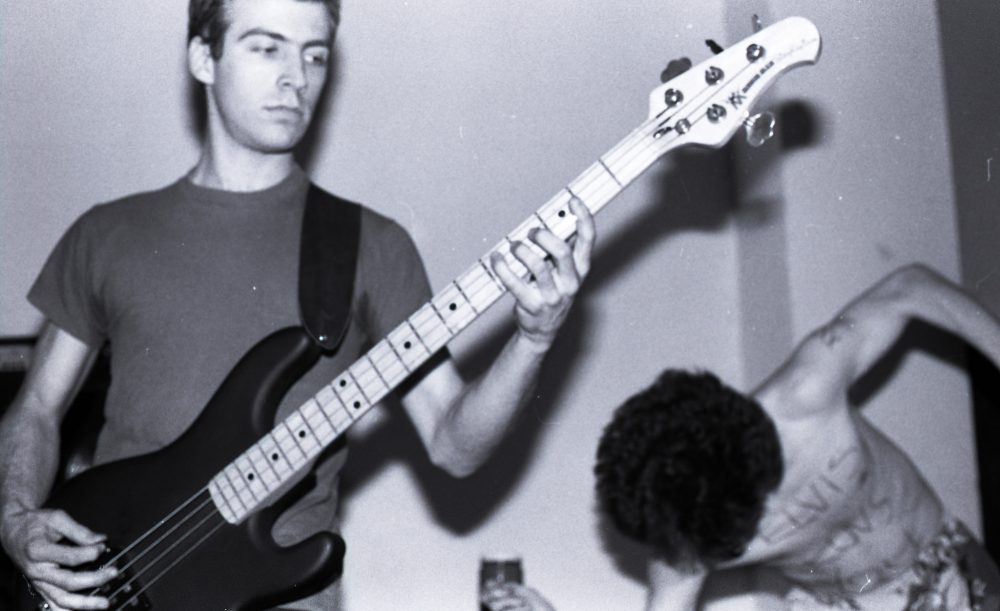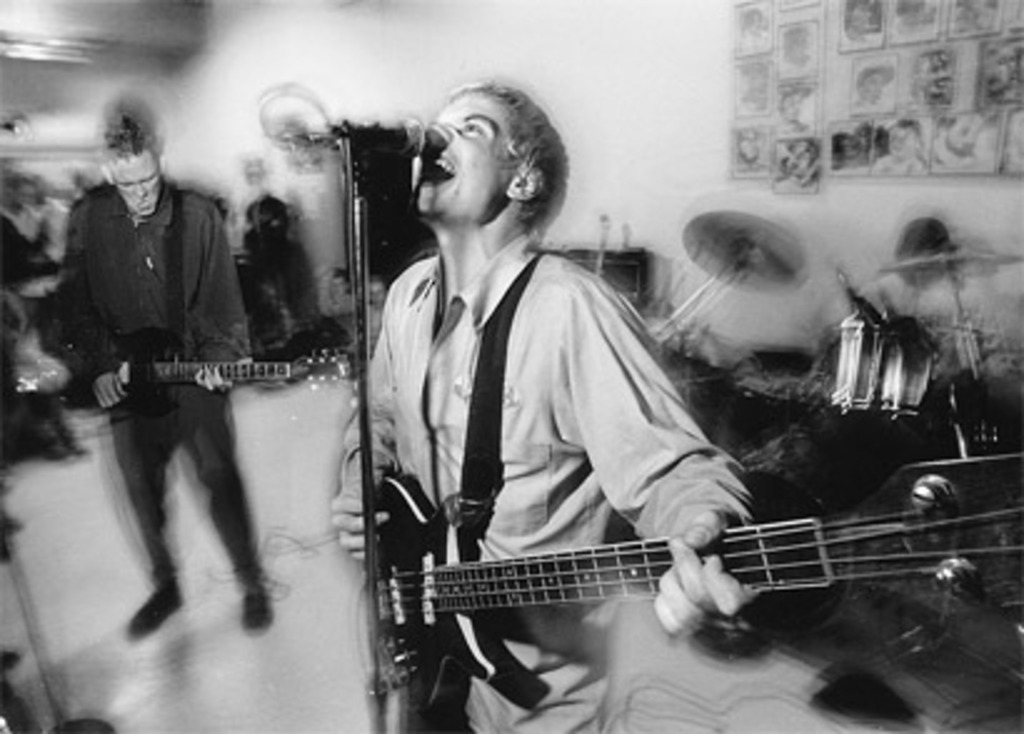
Image of Fugazi by Brad Sigal, via Flickr Commons
Apart from whatever political nightmare du jour we’re living in, it can be easy to dislike Washington, DC. I say this as someone who grew up outside the city, called it home for many years, and generally found its public face of monuments, tourists, politicos, and waves of lobbyists and bureaucrats pretty alienating. The “real” DC was elsewhere, in the city’s historic Black neighborhoods, many now heavily gentrified, which hosted legendary jazz clubs and gave birth to the genius of go-go. And even in the privileged, middle class neighborhoods and DMV suburbs. Among the skate punks and disaffected military brats who created the DC punk scene, a seething, furiously productive punk economy centered around Dischord Records. The small label has been as hugely influential in the past few decades as Seattle’s Sub Pop or Long Beach’s SST.
Formed in 1980 by Minor Threat’s Ian MacKaye and his bandmate Jeff Nelson, Dischord is 6 years older than Sub Pop and in several ways it inspired a template for the West Coast. Dave Grohl came from the DC Punk scene, as did Black Flag’s Henry Rollins. Rollins and MacKaye were childhood friends and DC natives, and MacKaye went on to form Fugazi, virtually a DC institution for well over a decade.
MacKaye’s brother Alec was a member of Dischord band Faith—one of Kurt Cobain’s admitted influences—and of Ignition with Gray Matter’s Dante Ferrando, who went on, with investments from Dave Grohl, to found the club Black Cat, a central hub of punk and indie rock in DC for 27 years. The more you dig into the musical families of Dischord, the more you see how embedded they are not only in their home city, but in the weft of modern American rock.
Dischord has been celebrated in gallery exhibitions, the hip documentary Salad Days, and the short An Impression: Dischord Records (watch here). Now they’ve released their catalog to stream for free at Bandcamp. The slew of bands featured offers a gallery of nostalgia for a certain brand and vintage of DC native. And it offers a pristine opportunity to get caught up if you don’t know Dischord bands.

Image of Hoover by Dischord Records, via Wikimedia Commons
The common features of its lineup—political urgency, earnestness, melodic experimentation, unpretentiousness—stand out. Dischord bands could be math‑y and technical, straight edge, vegan, Buddhist, Hare Krishna, fiercely feminist, anti-capitalist, and anti-war.… These may not sound like the makings of a great party scene, but they made for a committed cadre of hard working musicians and a wide circle of dedicated fans around the country who have kept the label thriving in its way.
What distinguishes Dischord from its more famous peers is the fact that it only releases bands from the DC area. Why? “Because this is the city where we live, work, and have the most understanding,” they write on their site. Still, given the label’s heightened profile in recent years, it’s surprising that so much of its music remains unknown outside of a specific audience. Fugazi is the best-known band on the roster, and for all their major critical importance, they have kept a fairly low profile. But this is the spirit of the label, whose founders wanted to make music, not make stars. Bands like Shudder to Think and Jawbox may have eventually moved to bigger labels, but they did their best work with Dischord.
Dag Nasty, Embrace, Government Issue, Make-Up, Q and Not U, Rites of Spring, Soulside, Void, Untouchables, Slant 6, the Nation of Ulysses.… these are bands, if you don’t know them, you should hear, and already have, in some way, through their enormous influence on so many others: not only Nirvana, but also a contingent of derivative emo bands some of us might prefer to forget. Still the label’s history should not be taken as the gospel canon of DC punk. One of the most influential of DC punk bands, Bad Brains, came out of the jazz scene, invented a blistering mashup of punk and reggae, and get credit for creating hardcore and inspiring Rollins, MacKaye, and their friends. But Bad Brains was “Banned in DC” in 1979, shut out of the clubs. They moved to New York and eventually signed with SST.
Other parts of the scene scorned the clean-living moralism of Dischord, and the label’s sober founders later found themselves “alienated by the violent, suburban, teenage machismo they now saw at their shows,” writes Jillian Mapes at Flavorwire. Dischord became known for championing causes on the left, a legacy that is inseparable from its legend. Not everyone loved their politics, as you might imagine in a city with as many conservative activists and political aspirants as DC. “Great political punk bands—like Priests—still exist in DC,” writes Mapes—and Dischord continues to release great records—“but the ‘80s scene retains its place in history as the pinnacle of political American hardcore music.” And Dischord remains a sometimes unacknowledged legislator of American punk rock in the ‘80s and ’90s. Stream their whole catalog at Bandcamp. You can also download tracks for a fee.
Related Content:
The History of Punk Rock in 200 Tracks: An 11-Hour Playlist Takes You From 1965 to 2016
Josh Jones is a writer and musician based in Durham, NC. Follow him at @jdmagness


Thanks for linking to our film- An Impression:Dischord Records!Best, Leena
The entire catalog isn’t available for download and what IS available has been since 2008.
it says for streaming idiot
It’s funny that a guy (Ian Mckaye) with a net worth of $25 million says that detaching money from everything is liberating. I can’t figure out how he made so much money since his record label sells records for cheap and Fugazi hasn’t played a paying gig since the 80’s?
True idiocy is the completely unfounded and bizarre comment, “Not everyone loved their politics, as you might imagine in a city with as many conservative activists and political aspirants as D.C.” Conservative activists? I don’t know if I’d recognize one if there is such a thing but there weren’t any protesting at Dischord shows. And I don’t think any flavor of political aspirant was taking issue with punk. Some people complained that the bands could be a bit preachy at times but that was more the moshIng fools who went running amok. Get it together, Mr. Jones. You can’t weave a report on DC’s homegrown integrity with its better know flavors of spurious bullshit without getting called a poser. Poser.
Thanks Andy, it wouldn’t be a comment thread on a punk article without someone yelling “poser.” I had the dubious fortune of growing up around a pretty large, well-connected network of conservative activists with political aspirations. They didn’t protest Dischord shows (but they sometimes got punk shows shut down). They did protest abortion clinics and LGBTQ orgs Dischord bands and fans worked for and supported and they sure as hell took issue with punk. A few of those people now work for or advise the current government.
It seems cool. But how do they pay their bands? That’s my question.
Maybe they’re doing the same thing that the rap label bmf did. Using the company as a front for drug trafficking?
Dischord,
This is why you always have been and always will be the best Record Label, because you’re all about getting the music out there to the fans that want to hear it! Thank you once again!!!
Good read. Enjoying the background music too. The comment section reads like lyrics to a Dischord song; seemingly somewhat intelligent in it’s own way, pushy, deliberate, scathing and pungent.
this label,like fat wreck chords or hellcat, make it a point to find epic bands like hoover, jawbox, embrace, etc. a lot of the folks who work at the labels work very hard & sell records for super cheap relative to major labels. they make their own policies and also play in some epic bands. a lot of money was on the table in the 1990’s. if you give music to the people to stream for free, it creates loyalty and eventually money. most bands have to tour constantly to support the life. digital vs analog has changed everything but if you are intelligent and not a money grubbing pig, people like ian, fat mike, tim armstong, etc., make great money from their labels. they all make amazing music as well so it is no surprise. cheers!!
Patrick Clark, how do you know what Ian’s net worth is? Just curious.
Patrick Clark… I saw Fugazi at the Castroville Rec center in ’98… Nice try though…
Music has value and should never be streamed or given away for free.
Hey interesting article. One point to clarify if you don’t mind 1) Who was ever Hare Krishna on Dischord? I have never personally heard of anyone — but I suppose anything is possible ? Was Tomas from Beefeater ever? They were great and super underrated. I think he was the only white member of a black muslim group once possibly? The label itself though was never known for that ever — certainly not like say straight edge was, or like being willing to play political benefits etc… That is obviously more in line . I have never heard of that though. Kinda seems a bit misleading even if like one person was ever at one time or something in the whole history of the label… There was never a band like for instance Shelter, or 108 or whatever other bands like that which for sure existed more in the general generic straight edge realm.
The “Comment” ist the stupidest invention since the invention of “The Barstool”.
He did’nt rape, he did not kill, he made very good music. what’s a net worth.
It’s funny how they don’t mention Iron cross .….….
Beefeater
Great band seen them in Omaha in 86–87 at the Fireman’s Legion Hall. There was a ditch behind there to skateboard. Great day best times. Still are
tocou no brasil nos anos 90
He probably means Tomas. I never knew him as a Krishna but people very often didn’t know what to make of him. I always found him really open and genuine.
Where do you a stream it from. All it comes up with when I click listen to dischord records is tik tok music app . So I downloaded it and still can’t find a link to all back catalogue.
Here’s the link…
https://dischord.bandcamp.com/
I don’t see any option for streaming on that page.